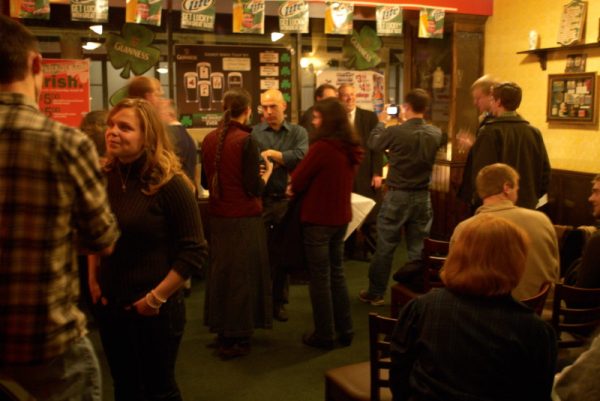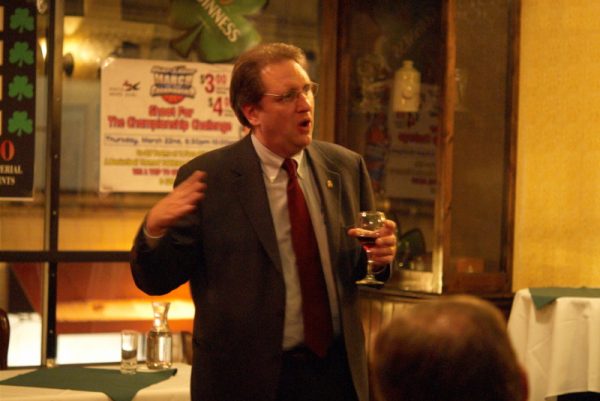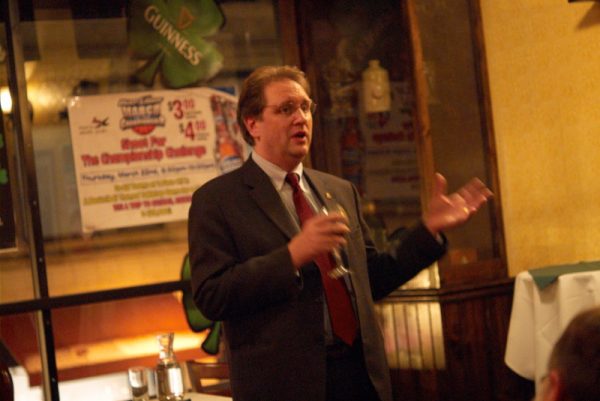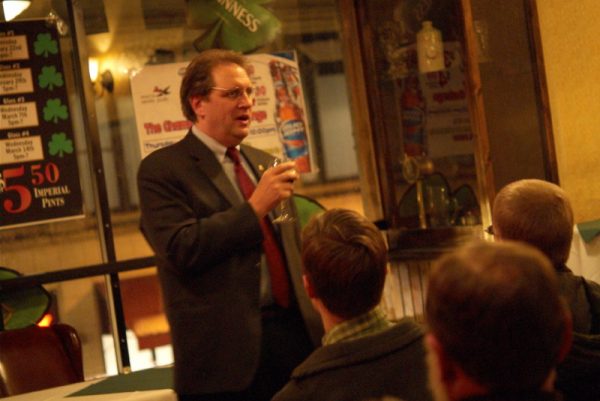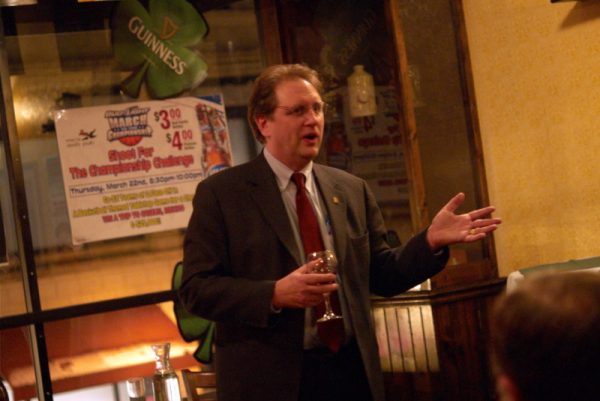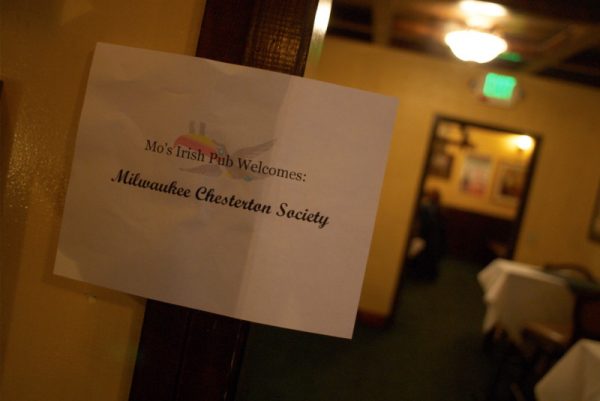Well, G.K. himself wasn’t in Milwaukee, since the prolific writer died in 1936, but Dale Ahlquist, president of the American Chesterton Society and author of numerous writings about Chesterton, WAS in Milwaukee on March 3 giving a lecture/Q&A on the famously-Catholic writer, philosopher, poet, and curmudgeon.
– – – – –
The event took place at Mo’s Irish Pub in downtown Milwaukee, at the corner of Plankinton and Wisconsin Avenues. The ground floor of Mo’s was packed with patrons getting their drink on, while upstairs there was an alumni gathering of some sort happening, and then in the back-bar was the gathering of the Chesterton Society.
My own familiarity with G.K. Chesterton goes back to when I was at Cardinal Stritch University. I was in my Design 101 class and our final project was to design a screen-printed fabric banner that would hang in the student union. On the banner was supposed to be some sort of inspirational quote. I can’t tell you how I stumbled across it, but somehow I found G.K. and this excellent quote that really resonated with me:
“the true free thinker is he whose mind is as free from the future as from the past. He cares as little for what has been as for what will be; he cares only for what ought to be.”
What with my love of super-heroes and comicbooks, that quote sure sang with me. Since then I had an affection for quotes from this Mr. Chesterton, but admit I did not do much to learn about him. I would quote-search him on occasion, read one of his books “Manalive” (which I need to re-read), heck, I even spent a few years as a paid member of the American Chesterton Society. I admit though, that I never took time to study him in-depth. Life always had more things to draw my focus to. When I saw an announcement for the lecture at Mo’s, it felt like the opportunity I needed to finally learn more about Mr. Chesterton.
– – – – –
Dale Ahlquist gave a light-hearted and humorous lecture, walking back and forth, sipping wine and quoting G.K. from memory – an easy task, as he’s spent over 30 years studying the man and his writings. The lecture started with a short introduction to G.K. and what his life was like, and then became a Q&A for the 40-50 attendees. Here are the notes I took…
(DA = Dale Alhquist, GK = well, it’s obvious, innit?)
+DA described GK’s writings as often stating those “truths” that have always been there, but never clear to us till he put them in words.
+GK was alive from 1874 to 1936.
+ GK wrote 100+ books, 200+ introductions to books, 100s of poems, 5K+ essays, edited books, and wrote for London newspapers.
+allegedly, GK could write one essay in long-hand while dictating a different essay to his secretary.
+philosophically, he was a “defender of tradition” and believed that “tradition was the democracy of the dead.”
+GK was brought up as a Unitarian, then was a member of the Church of England (1901), then famously converted to Catholicism (1922). DA told an anecdote where an English vicar, upon hearing of GK’s conversion said, “it’s fine he’s become a Catholic as he was never much of an Anglican.”
+It seems that our contentious media and politics could learn something from GK about the coexistence of differing opinions. GK maintained friendships with many people who he had very large differences of philosophy with – “the other side of the fence”. He felt you needed to “attack the argument, not the person”, and that whenever arguing, you needed to start with a point of agreement and go from there. I love that, so let’s repeat it: start with a point of AGREEMENT.
+There was some discussion on the philosophy of distributionism, but that was not delved into much. I need to do some more reading. Distributionism What was pointed out by DA, is that in distributionism, “the solution is in small businesses, and the problem is in big government and big businesses.”
+I asked a question about GK’s tolerance for other faiths, since he was such a vocal Catholic: did he allow for the validity of other faiths? DA suggested that for GK, religion boiled down to two basic philosophies: the Western religions, which sought fulfillment/heaven/afterlife, and the Eastern philosophies/religions, which sought nirvana/nothingness/absence of afterlife. Through his studies, GK concluded that for him the Western approach was more fitting and he gave himself to that doctrine which fit him best and became quite passionate about it: Catholicism. GK was not given to preaching for conversion, but would try to show people commonalities between Catholicism and a different approach, and then work towards why Catholicism was a better end result.
+GK wrote often on the importance of maintaining a sense of wonder towards the world: “The least grains of dust have not been praised enough.”
+he was a stout enemy of fad and fashion, believing that passing trends were not something to place your faith in.
+GK humorously suggested the depth of his sense of generosity by stating that when he rose to give a woman his seat on the public bus, he actually was allowing THREE women to have seats. 🙂 He was a rather large man, given to a number of chronic ailments and a determined habit of cigar-smoking.
-For more info on the American Chesterton Society, go HERE.
-For more info about Mr. Chesterton, go HERE.
-For information about the upcoming film-version of Chesteron’s “Manalive”, go HERE.
-I really had a swell time at this lecture and learned alot about G.K! I’m very thankful to the Milwaukee Chesterton Society who hosted it!
